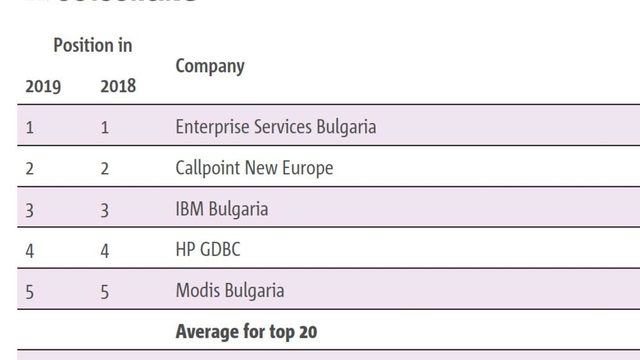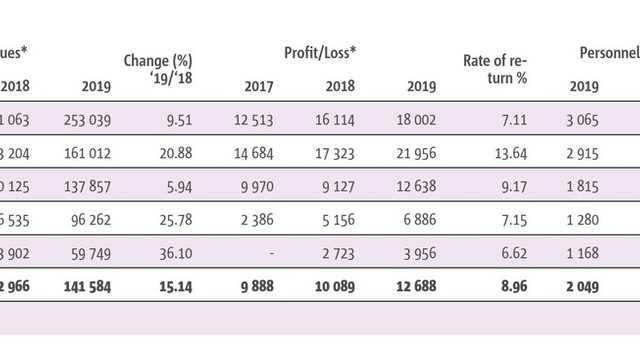For years now, Bulgaria's outsourcing industry has retained its role as one of the most significant employers of (not only) young qualified people in the country. It is a field where some of the largest companies in the world are active, such as Google, Facebook and Spotify; in addition to business process outsourcing (BPO) firms, the industry also boasts separate offices for outsourced processes of global giants such as Coca-Cola, AIG, Cargill, AES. At the start of 2020, the top 20 BPO companies employed around 30 000 people. In 2019, the sector continued expanding, which is reflected in the K100 industry ranking of the industry's top five companies. This long-term growth may, however, come to an end in 2020, with the coronavirus crisis being felt across the sector. Last but not least, it may lead to a significant change as well.
Outsourcing has long ceased to suggest merely customer service through call centres. Nowadays, it represents an industry with a growing array of value-adding services and technologies. It is mainly divided into two groups: BPO and IT outsourcing (ITO). Representatives of the latter such as Bulpros and Scale Focus are included in Capital's software company ranking. Due to the complex services provided in this industry though, boundaries between different activities are becoming increasingly blurred. There are certain companies that are active in both BPO and ITO, with the leader in this year's edition of K100 ranking being an example of this.The total revenue of the five BPO industry representatives in the ranking amounts to BGN 707 million, or a 15% increase over last year. The increase in the number of employees by 600 to a total of 10,800 is smaller in percentage terms. All companies in the ranking are parts of larger, international groups. The top three players remain the same and are becoming increasingly large.
The leader
Enterprise Services Bulgaria is the industry's number one for the third year running. The company is the successor to a long-standing leader in the industry - Hewlett-Packard Global Delivery Bulgaria Centre and is a result of the global merger between Hewlett-Packard Enterprise and Computer Sciences Corp. in 2016, which led to the creation of the new DXC Technology group. Even before that transaction, both companies held large engineering hubs in Bulgaria. After that deal had been concluded, Bulgaria became the seat of operation for Enterprise Services Bulgaria and the Bulgarian company DXC Technology Bulgaria (formerly known as CSC Bulgaria) with around 400 employees. The latter is part of Capital's software company ranking, but both companies are ultimately owned by American group DXC Technology.
Enterprise Services Bulgaria mainly serves customers of DXC Technology, with its key clients located in Germany, the USA and Great Britain. The company focuses on IT support and other services such as management of technological infrastructure, business reporting. Last year, its revenues went up by BGN 22 million compared with 2018, reaching BGN 253 million.
...and the rest of the pack
The second-placed company boasts the highest nominal increase in revenues and the most dynamic development in recent years. After growing by 13.5% in 2018, Callpoint New Europe increased its turnover by BGN 28 million to BGN 161 million, or over 21%, in 2019. The company is active in Bulgaria under the TELUS International Europe brand, as part of the Canadian telecommunications giant TELUS which acquired it in 2012 (company profile, see page....). Callpoint New Europe is active in Sofia and Plovdiv, with both offices having been expanded in 2019, and provides services to its customers in over 20 languages.
This development is a result of acquiring new partners such as Facebook, as well as the expansion of activities to industries including gaming. Over the last year, the company began a partnership with Facebook aiming to hire 150 more employees to moderate the content on the social network. The company employees grew to over 3000 last year and as of mid-year (mid-2020?), they already exceeded 3500. Callpoint New Europe also remains the most profitable company in the ranking with a profit of BGN 22 million for 2019?, BGN 4.5 million more than in 2018?.
The third place is occupied by a well-known player: IBM Bulgaria which returned to growth after its decline in 2018. The company's turnover rose to BGN 138 million in 2019, compared to BGN 130 million in the prior year. The company sells services both within the IBM group and to external customers, most of which come from the banking and financial services sector. After the decline in recent years, the company is back to registering growth in headcount, albeit slight: up to 1850 employees at the end of 2019.
The company that used to lead the sector up until a few years ago, Hewlett-Packard Global Delivery Bulgaria Centre, comes in fourth. It used to be in pole position until Hewlett-Packard Enterprise merged with Computer Sciences Corp., the latter setting up the company DXC Technology, as already described above. Following that merger, part of the activities remained within Hewlett-Packard Enterprise so Hewlett-Packard Global Delivery Bulgaria Centre's business decreased but still remained relatively large for the sector. The company's turnover has grown by 26% to BGN 96 million. The Bulgarian company supports its mother entity HP, as well as customers located primarily in German-speaking countries such as Germany, Austria and Switzerland. The main array of services covers IT infrastructure, project management and business reporting.
Occupying the fifth spot is a new company which is however well known in the Bulgarian market. Modis Bulgaria is the successor to sector giant Adecco Bulgaria which used to be locally active in two main areas - recruitment and outsourcing. Since the beginning of 2018, their BPO business has spun off into a new company, Modis Bulgaria, with the brand Adecco now primarily retaining the services related to the HR agency. Modis currently employs more than 1200 people, with its revenues over the past year has grown by the highest percentage seen in our ranking: up 36% to almost BGN 60 million. The company provides services to a wide array of industries, and they let Capital know that they are expecting growth in this year as well, mostly due to a new customer who manufactures and sells consumer electronics, computer software and online services.
The year of the coronavirus
Expectations in the industry are that this year will see a slowdown in the rapid development of companies and even lead to a transformation of the overall business model due to the impact of COVID-19. The sector has already survived another significant cataclysm - the financial crisis of 2008-2009, but that was a time when companies in this field were substantially smaller, as was the sector's overall impact on the Bulgarian economy. The state of emergency introduced this spring led to around 85-90% of employees in the private sector working from home.
Only those whose clients place significant importance on confidentiality and have special requirements with regard to security have stayed behind at the offices. No one can say whether remote work won't turn out to be the new standard, which in turn would have an impact on other industries, such as office space rental. Aside from that, a large portion of companies in the sector has lost projects in the most affected industries such as the hotel industry and travels. There is still room for optimism, though - at the same time, customers in the field of gaming and e-trade are growing. However, no one can tell whether that would be enough to revive the sector.

For years now, Bulgaria's outsourcing industry has retained its role as one of the most significant employers of (not only) young qualified people in the country. It is a field where some of the largest companies in the world are active, such as Google, Facebook and Spotify; in addition to business process outsourcing (BPO) firms, the industry also boasts separate offices for outsourced processes of global giants such as Coca-Cola, AIG, Cargill, AES. At the start of 2020, the top 20 BPO companies employed around 30 000 people. In 2019, the sector continued expanding, which is reflected in the K100 industry ranking of the industry's top five companies. This long-term growth may, however, come to an end in 2020, with the coronavirus crisis being felt across the sector. Last but not least, it may lead to a significant change as well.
Outsourcing has long ceased to suggest merely customer service through call centres. Nowadays, it represents an industry with a growing array of value-adding services and technologies. It is mainly divided into two groups: BPO and IT outsourcing (ITO). Representatives of the latter such as Bulpros and Scale Focus are included in Capital's software company ranking. Due to the complex services provided in this industry though, boundaries between different activities are becoming increasingly blurred. There are certain companies that are active in both BPO and ITO, with the leader in this year's edition of K100 ranking being an example of this.












